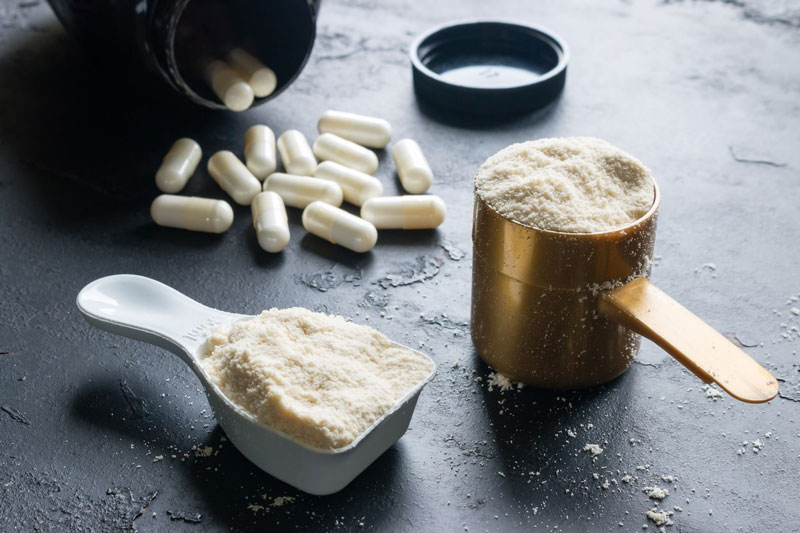If you’re serious about working out, you’ve probably heard of BCAAs or branched-chain amino acids. They’re increasing in popularity and rivaling the sales of even whey protein, one of the most popular weight lifting supplements to date. Can you benefit from BCAAs? Do you get enough BCAAs in your own diet? Are they safe? Keep reading to learn all about BCAAs and if you should add them to your diet and exercise regime.
What are BCAAs?
As you know, when you work out you tear your muscles. It then takes time for the muscles to rebuild, which is how they get stronger. This is why oftentimes after working out, you can’t lift your arms or your legs feel like Jell-O. This may cause you to reduce the frequency, duration, or intensity of your workout.
BCAAs or branch chain amino acids are the building blocks of protein, which is necessary to repair your muscles. BCAAs are actually a group of amino acids including:

- Leucine – This is the most important amino acid that helps with muscle growth. It’s also the amino acid you lose the most of when you exercise.
- Isoleucine – This amino acid helps with muscle growth as well as helps you build endurance.
- Valine – This amino acid helps limit the muscle breakdown while working out, which provides more energy and endurance that many athletes desire
When you consume BCAAs, whether through your regular diet or with supplements, you decrease the likelihood of experiencing muscle soreness, fatigue, and the inability to work out as often as you’d like.
Benefits of BCAAs
While BCAAs aren’t a ‘quick fix,’ they do have many benefits that athletes enjoy including:

Helping to build Muscle
This is the most common reason people take BCAAs. The supplements help reduce muscle fatigue, allowing you to work out longer. They also speed up the muscle repair process, allowing you to do more faster, rather than waiting because you’re too sore. BCAAs help your body process protein faster, enabling you to work out more frequently and harder.

Reducing Delayed Onset Muscle Soreness (DOMS)
We’ve all been there. You work out and feel great. It’s not until the next day or even two days later that you suddenly can’t move your arms or legs. BCAAs may help limit the muscle soreness, by decreasing the amount of damage your muscles experience.

Providing more energy
As you work out, your muscles tear and start to look for BCAA in your bloodstream. This depletes the BCAA from your bloodstream, which triggers a feeling of tiredness in your brain. When you supplement with BCAAs, you reduce the risk of premature fatigue, allowing you to work out more.

Increasing your immunity
While working out is good for your body, it can suppress your immune system too as a result of a drop in glutamine. BCAAs convert into glutamine in your muscles, which helps your immune system stay strong.

Reduce muscle wasting
If your muscles breakdown more protein than your muscle protein synthesizes, you may experience muscle wasting. This is common with the chronically ill or even older athletes. BCAAs can prevent, stop, or reduce the amount of muscle wasting that occurs.

BCAAs may help with liver disease
While it’s not directly correlated to working out, BCAA supplements have been shown to help improve the lives of those with end-stage liver disease.
When to Take BCAA’s
Experts often disagree on when you should take BCAAs, but most research points to the benefits of taking them both before and after your workout.
- Before your workout – Taking BCAAs before your workout helps your body release more energy that may help fuel your workout
- After your workout – Taking BCAAs after your workout helps your muscles recover faster. Adding them to your post-workout protein shake is ideal. Your muscles will benefit from faster healing and possibly faster growth (more bulk).
Some athletes also take BCAAs in their drink while they workout. If you suffer from premature fatigue, inability to focus, or muscle tiredness, you may want to experiment with taking the supplement while you work out too.
How Much BCAA to Take
According to a recent study, adults should consume the following amounts of BCAAs each day:
Women – 9 grams
Men – 12 grams
These requirements may be higher for athletes or those that work out often. If your diet is rich in proteins, you may get enough BCAAs, but most athletes and those participating in heavy lifting, need more.
On average, athletes and heavy lifters should supplement with an average of 10 – 20 grams of BCAAs every day. When you look at BCAA supplements, make sure leucine is one of the top ingredients, as it’s the most important.
If your diet is deficient in foods that supply BCAAs naturally, you may want to look at the higher end of BCAA supplement consumption. The foods high in BCAAs include:
- Meat, such as chicken or red meat
- Chicken
- Fish
- Milk
- Cheese
- Eggs
- Nuts
- Seeds
- Beans
- Peas
If you have a diet rich in proteins, you may need a lesser supplement to fuel your muscles. Talk with your doctor to decide which dosage would be right for you.
BCAA Powder vs Pills

Ideally, BCAA powder works faster as it’s immediately absorbed in your bloodstream. Pills, while they may work, take longer to show their effects. The powder is easy to mix with your water, sports drink, or protein shake, giving your muscles direct exposure to additional amino acids.
In a pinch, capsules can be helpful, especially if you travel with them and need something convenient to take before or after you work out. If you plan to take them before a workout, do so a few hours before rather than the 30-minutes prior to a workout that the powder requires.
BCAA Side Effects
BCAA supplements are thought to be generally safe for healthy individuals for up to 2 years when taken as recommended. A few rare side effects some people experience include:
- Fatigue
- Difficulty with coordination
- Stomach issues (diarrhea, vomiting)
- High blood pressure
These side effects aren’t common and most people don’t experience them, but it’s always a good idea to discuss the possibilities with your medical professional before taking BCAAs.
BCAAs for Men vs Women

Most studies conducted on BCAAs study the effects on men rather than women; however, BCAAs have just as many benefits for women.
The studies that have been done prove that BCAAs have similar effects on women including:
- A study conducted at Nagoya University in Japan found that women who took BCAAs before a heavy squat workout had less delayed onset muscle soreness and faster muscle recovery.
- Other studies have shown that women have improved body composition, more muscle mass, and less fat mass
BCAAs do have their benefits and they do help athletes and heavy lifters build larger muscles by providing the protein synthesis the muscles need. BCAAs aren’t just for those that want to ‘bulk up,’ but also those that get prematurely fatigued, want to shed body fat, or those that just want to be able to work out more often. Even if you’re a prominent meat eater, there may be a benefit for you to add BCAA powder to your diet and workout regime, especially right before and right after you work out.
Best Selling BCAA’s on Amazon
[amazon bestseller=”bcaas” items=”10″]

